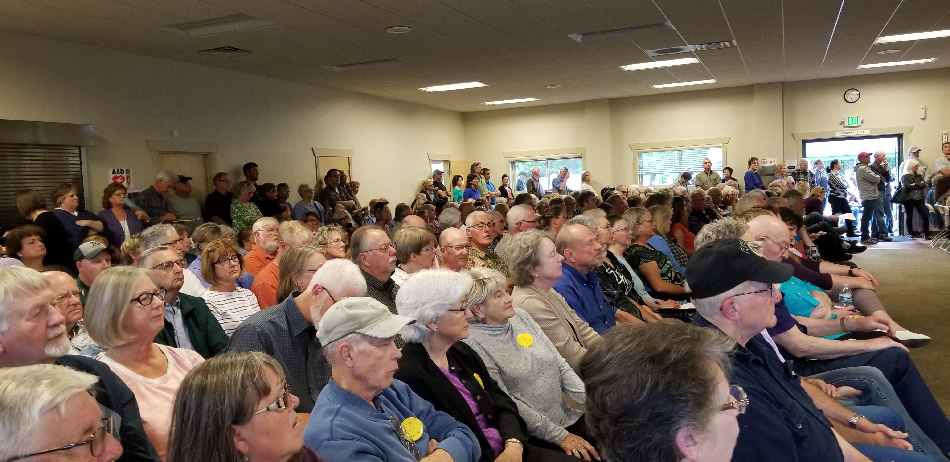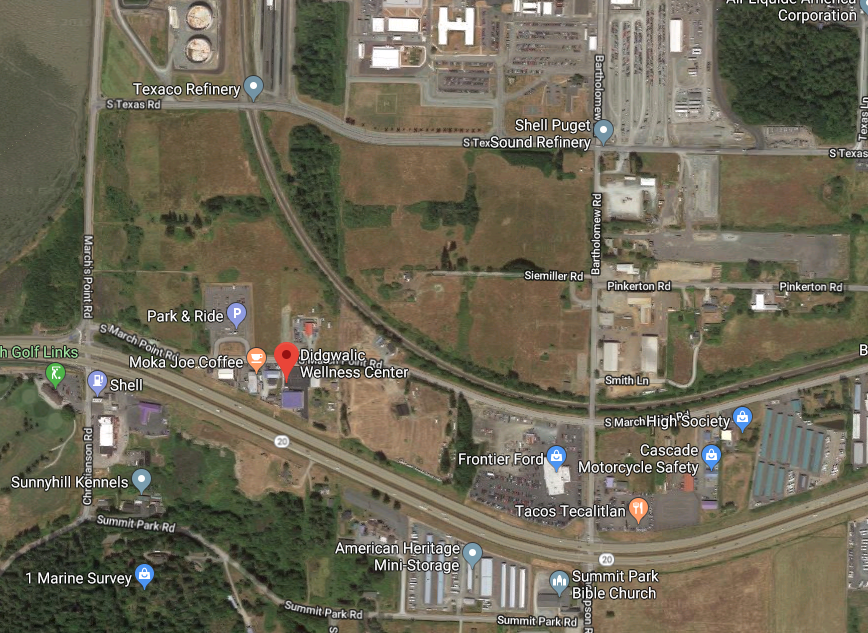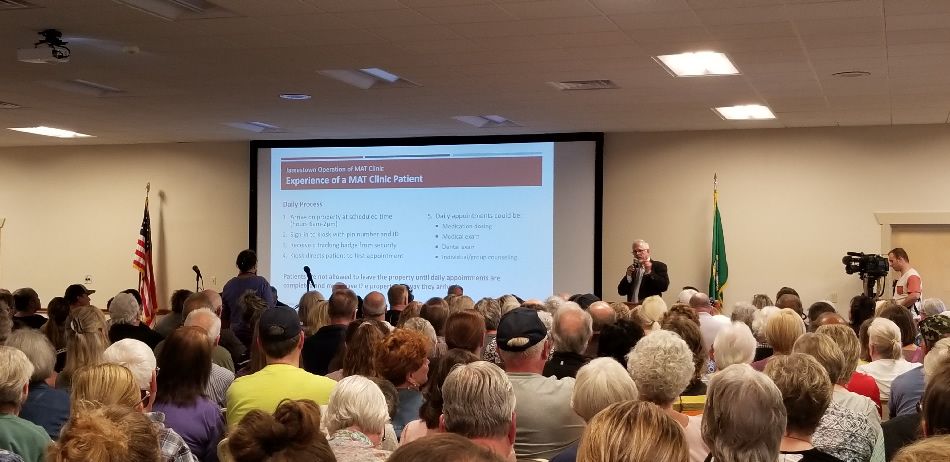By Lois Krafsky-Perry and staff
August 12, 2019

Close to 1,000 people jammed the Guy Cole Convention Center to hear Tribal representatives and testimonies from citizens.
Sequim, WA – “We are starting early,” announced Ron Allen, Chair and Chief Executive Officer (CEO) for the Jamestown S’Klallam Tribe (the “Tribe”), as he urged approximately 1,200 attendees to find an empty chair, in a building which has a recorded capacity of 775 people.
The Guy Cole Event Center, which is located at Carrie Blake Park, was chosen to accommodate an expected large crowd, many who had to stand outside for the meeting, which ran from 6 to 10 PM. The Tribe had called a special meeting for August 8, to explain the Medication Assisted -Treatment (MAT) clinic being planned for Sequim, behind Costco, located at South West 9th Avenue, on the purchased 19.5 acre Norman Dawley farm. According to a comment at the previous City Council meeting, another 20 acres – the Berger farm adjacent to the west of there – is being discussed for their purchase.
The Tribe has changed the name of the clinic to “Healing Campus”.
Doors were opened at 5 PM, as more than 100 people were gathered waiting to enter the building. Many had come before 4PM to be sure to get a seat. Several rows of chairs (approximately 60) were roped off and saved for “us”, said the young lady who was guarding the chairs, as people entered the area. Apparently they were pre-arranged, for special seating, by the Tribe. Some of the individuals seated there later testified on behalf of the proposed clinic. Many were from other areas of the State, from outside the Sequim community.
Later during public testimony, after equal time was given to the designated attendees, Allen announced that those testifying did not have to give their names. Therefore, it is noted that there would be no way that their testimony could be accurately recorded.
Paul Cunningham, Chief Medical Officer at Jamestown Medical Health Clinic, introduced elected leaders who were present: Bill Peach, Clallam County Commissioner, Connie Beauvais, Clallam County Port Commissioner, and Bill Benedict Clallam County Sheriff. County Commissioner Mark Ozias (D) and Steve Tharinger (D), a Representative for the 24th District attended the meeting, but were not introduced, although Allen announced earlier that Tharinger was listening. Ozias testified later.
Pastor of Sequim Community Church Scott Koenigsaecker was asked to lead an invocation.
Members of the panel were introduced : Paul Cunningham, Brent Simcosky, Kurt Grinnell, Jamestown S’Klallam vice chair, Mike Glenn, Jefferson Healthcare CEO, Thomas Locke, Public Health officer, Jefferson County.
Allen announced, “We understand it is very well passionate for a lot of people, with various concerns,” remarked Allen, as he opened the meeting. “This is to be one of a number of meetings”.
Allen later stated that he is the chair on an advisory committee for Medicare and Medicaid. [It’s a] “complicated business structure,” he said. It brought laughter by the attendees when Allen later in the meeting declared, “many of our patients will be driving themselves”.
Cunningham was introduced to facilitate the meeting. He specializes in family medicine and geriatric, hospice and palliative care and is board certified. He introduced Dr. Thomas Locke, who gave an overview, “How did we get to where we are?” He stated there are three main drivers to the crisis: 1.) High dosages prescribed; 2.) The nature of the drugs themselves. “Endorphins we developed through evolution,” touted Locke. 3.) The Mexican Cartel, cheap black tar mixed with heroine.
“Replacing the missing endorphine – methadone, the only thing that will work”, Locke asserted. An opioid block with a Vivitrol injection. Locke mentioned Washington State Health and others who are behind the programs.
Among other agencies, the Attorney General, “they all support MAT…MAT is the full gun,” announced Locke. He ended with, “Now is the time to work together and apply what we have to end the opioid crisis”.

Didawalic Wellness Center, the Swinomish MAT Center near Anacortes, is located approximately 5 miles outside of town, in an open area.
Brent Simcosky was introduced. He had just traveled to Anacortes, Washington, where the Swinomish Tribe resides, and visited their center. “We want to try something different,” he said, in partnering. “Anacortes has property zoned for health care.” He continued, “It is very difficult to zone something in this county”.
According to Allen, in a later statement, the City of Sequim changed its zoning in 2017, to accommodate a healthcare facility.
“We all went to the state to ask for funds – $7.2 million. Tribe will pay $3 million to complete”, said Simcosky. He referred to legislation and said, “We like to put our money where our mouth is.”
Dr. Mike Glenn, who resides in Sequim, announced that if the attendees want to see the strategic plan, “go to their website”. He continued, “ These problems are so big, there is no way Olympic Medical can deal with them.” He added, “We need State Capital funding for Phase 2, which could be a 7-14 day treatment, managed by OMC. “We are going to do it well”, he remarked.
Glenn later said, “We are used to collaborating…we meet quarterly.” He stated that Port Townsend received $1.5 million from State Capital allocation process. “We are very positive about the Campus Model,” announced Glenn.
Allen stated there would be a local safety plan, coordinating with local agencies, an on site security team system and protocols. He said it was copied from the Anacortes Swinomish Tribe.
Sheriff Bill Benedict said he traveled to Anacortes recently to view their clinic. “I am not an advocate for location, not the Sheriff’s job,” he stated. “Jamestown contracted with me for law enforcement…good partner for safety of this community,” he remarked.
Benedict said he was at their location for two hours and appeared satisfied with what he observed. He announced, “I have been involved with the Tribe (Jamestown S’Klallam) for 10 years. Not involved in the real estate part of it, nor should I be.”
Allen said, “Our plan for MAT security: it will be all lit up. There will be coordination with City police and Sheriff (County). If there is a problem. They will be unarmed. It is the job of our police,” remarked Allen. “Part of our game business plan when we are done,” he continued.
“Not a for profit clinic.. we are not”, announced Allen.
After approximately 45 minutes of presentations by the panel, attendees began to line up at the microphone. It was apparently coordinated for opposite views on two microphones and they were directed by someone to speak alternately.
Seventy-five people testified, plus comments by the panel.
Wendy Goldberg representing “Save our Sequim” (SOS) , a moderator for the group, was the first speaker, in that she approached the microphone early.
“Sequim is the wrong location for a large MAT clinic, “announced Golberg. She offered statistics where overdoses occurred and said many more of them occurred on the West end, including Port Angeles. “What about the other Tribes on the west end?” she asked. “Consider a different location, where Tribe has property west of Sequim near Port Angeles,” declared Goldberg.
Timothy Wheeler, a Sequim high school graduate, thanked the Jamestown Tribe, “for providing for me and for my wife.” He is a former editor of the People’s World and served as a journalist for many years for the Daily World and the Worker newspapers, featuring a Communist agenda and issues. He said “We should be proud the clinic is going to be in our community.” He mentioned, “the profit seeking pharmaceutical companies”.
“Hope we do it with full community support”, said Wheeler.
Many others who testified on behalf of the MAT clinic gave testimonies about their involvement with the program. Although the main complaint by those opposing the MAT facility is location, the location was not the concern of those in favor of the clinic. Many of them were not from Sequim. They shared stories of drug abuse and help and made continual pleas for “compassion”.
Jodi Wilke, who heads the SOS group, offered a three page rebuttal to the panel and City of Sequim. “You have your points of view and also the City opposing, and there is no view of our public issue-we have not been allowed. Only one side is represented. If we cannot be allowed we ask the City to provide us with an opportunity to do so,” requested Wilke. She continued, “represent the City of Sequim to marginalize”.
Bobbie Piety said, “Kudos, but what if things don’t happen as planned?” Crimes per se. There are laws. Police say,”we won’t do anything; they are homeless,” She asked who is going to do what to fix it.
Steve, who did not give his last name, as suggested by Allen, said that people are in good faith. “The problem is real. What is missing elephant in the room is location. He stated that sewers already exist at Jamestown and also the golf course. He said this is a regional problem and it has to do with fitting into the community. “I would ask both to put together a program that does not do harm”, requested the Sequim resident.
Allen said the area was already zoned for health care, although he also said, as did others, that the zoning was changed in the project area two years prior. He then said they wanted an area close to our existing health care and collaboration with OMC (Olympic Medical Center).
An unidentified woman said, “Everyone wants everybody to get healed. Is gambling also an addiction? Take down the casino and put a treatment center there. And a Marijuana shop. Then take a stab at healing people. Why are you inviting and promoting marijuana,” she asked. Allen answered, “Gambling and alcohol are legal in Washington State, as is cannabis”.
Another citizen said, “Your fact sheet says you regulate loitering by Federal Law with an agreement with DEA (Drug Enforcement Agency). Do you have an agreement?
Simcosky answered, “We have to supply a series to the DEA”.
Inga Able, who originally started the SOS group, said she is not against health care. “Our problem is location,” remarked Able. She said our median age is 56 and Washington State is 37. We do not have an emergency room and there is a lack of subsidized housing, in our town. She reminded the panel that Sequm now has a low crime rate.
She stated that the town of Anacortes, which has a clinic, is outside the town in an industrial area. Able reminded the panel that there are other addicts also dying from other drugs.
Helen Tague, a longtime Sequim citizen whose family had owned a large farm west of the projected clinic, said she has seen a lot of changes. “A big mistake is the property behind Costco. I beg you to reconsider the location. They need help, but not behind Costco. City of Sequim where were your heads at?’ quizzed Tague.
Adams from Port Townsend said, “You are afraid of a problem rather than a solution.”
“Roger” said “Thank you S’Klallam Tribe. Simcosky reported that half of the people support this. I dare say the majority does not. Let’s start telling the truth. A halfway house will settle here. This is a nefarious plan. It is against Washington law.” He chastised the City Council that made decisions, “in front of a community that supports them. What harms our children and our elderly will also harm you”, warned the local citizen.
Julie Hendrickson, whose family has resided in Sequim for many years, stated that Port Angeles already has a facility. “You did a feasibility study but no social impact study? The state did not require you to do a study, asked Hendrickson.
Simcosky answered, “It is part of the application process”.
Allen answered by saying, “We perceived this question might arise. We will plan to address it. We cannot guess what is not going to happen. It does not start right away”, he remarked.
A man from Port Townsend with no name said he was a Public Defender. “Please do put it in our back yard,” he taunted.
Several of those giving testimonies gave examples of how they had been helped by drug clinics. They apparently had no problem with the location of the clinic, in our town, of Sequim.
A woman later turned toward the large group of people on the other side of the room and said, “you work for them,” as she pointed to the panel, representing the Tribe.
Dr. Sandra Collins retired in Sequim many years ago. She was a Psychologist in Criminal law for 37 years. She directed her comments to the City Council. “We were lied to and deceived and not answered,” said the Sequim resident. She referred to the City attorney Kristine Nelson Gross who in an earlier council meeting told one lady to shut up and sit down. “These are against all ethics of the law.” She stated that if you have been planning for three years, why the secret forums? “Why not a vote, you work for me. If there was a vote of the people, the people would have spoken, not just your bunch”, she declared.
Joseph (first name only) agreed that it should go on the ballot and let the people decide.
Ted Lawton, Sequim asked, “Is it too late to find another location in Sequim area?”
Allen answered, “Yes, we are moving forward, for sure not going to happen”. He stated that they had looked at Blyn and also Carlsborg and then this land became available and felt it was the best place to put the clinic.
When asked when it was zoned for the health care zone, Simcosky answered, “It was 2017”.
Lisa, from Sequim said, “Several presentations to the board (Sequim City Council) for a couple of years, it has been talked about”.
A former police chief in Forks said, “The people that follow this type of facility are a problem. It is ripe picking for dealers, right in town, people coming to town. These are the ramifications and this is the truth”.
Jenna Rose, Sequim, said she had great compassion for the drug addicts. She asked to drop the word regional, “Local is the best for Sequim”, she stated.
Mark Ozias, Clallam County Commissioner (D), said he helped craft the behavior health system. He said it is inevitable that communities have issues that divide us. He criticized those who name businesses, “that do not support”.
Mel Shaw, who owns a neighboring farm to the clinic area, testified about her family farm, which has been in the valley since 1896. She described the destruction being done to their property, as a result of the project. “What you are going to do is going to destroy our farm,” she affirmed. She asked for compassion for her elderly mother, who is living here.
Local Realtor Brody Broker said that no one is against treating addiction. He said he visited the Swinomish clinic, and noticed that it is several miles outside of town. “You can’t get to it easily,” he said. He suggested that if they were going to “model” their facility after the Swinomish clinic, that they also model the fact that it is not in the center of a town, but several miles outside of it. “You can see that the community is concerned about this,” he stated.


Recent Comments